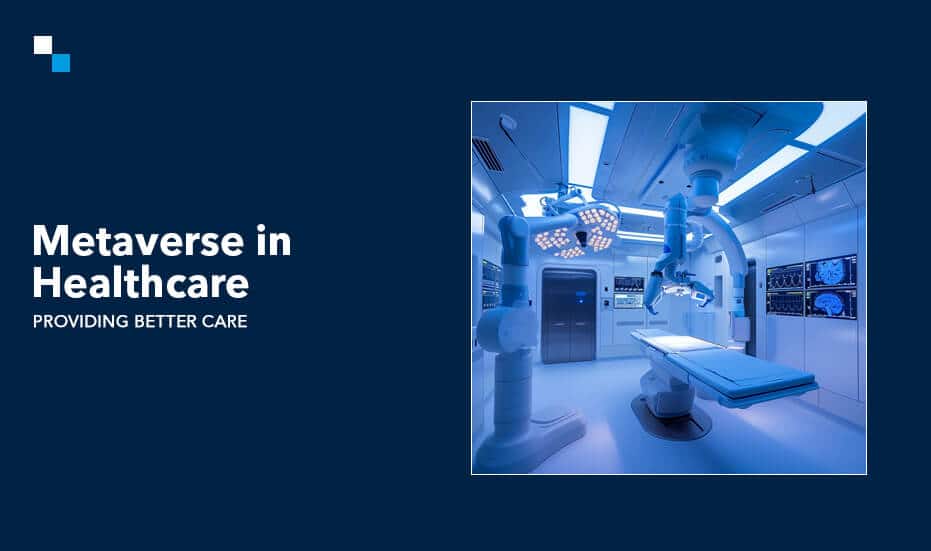The metaverse technology, while still in its nascent phase, is already making waves in the healthcare sector. The interest in metaverse healthcare development solutions is on the rise among healthcare providers as well as patients.
Amidst the ongoing evolution of healthcare practices, the metaverse stands poised to revolutionize the industry by providing a virtual realm that transcends the constraints of traditional medical settings, reshaping how treatments and care are delivered and received.
The Journey of the Healthcare Industry
The healthcare industry has made significant strides in recent decades, yet the current pace of advancement is truly remarkable.
Innovative technologies, novel concepts, and increased automation are reshaping the landscape. Concepts once confined to science fiction films, such as drones delivering vital medical supplies, stem-cell therapies for diabetes, portable ultrasound devices, and virtual reality aiding rehabilitation progress, are swiftly transitioning from imagination to actuality.
Transformations Driven by the Metaverse
1. Virtual Hospitals
Telemedicine has broken down geographical barriers between healthcare providers and patients, yet video consultations often lack the same level of personal connection found in traditional in-person visits.
The concept of metaverse healthcare development solutions introduces a novel approach to accessing high-quality healthcare from the comfort of one’s home through virtual hospitals.
Within the metaverse, virtual hospitals replicate the ambiance of physical medical facilities, enabling patients and healthcare professionals to interact through avatar-based virtual consultations. This innovative model may incorporate telepresence technologies, allowing healthcare providers, which are represented by avatars, to digitally visit patients in their residences.
Furthermore, individuals sharing similar health issues can create support networks and communities to share experiences and provide mutual emotional support. Meanwhile, healthcare professionals can collaborate with peers, discuss cases, and enhance their skills through interactive simulations and 3D models.
2. Digital Twins
A digital twin utilizes real-time data to comprehend diverse processes and concepts, generating virtual simulations of a wide range of entities, including replicas of patients and biological systems.
Healthcare professionals collaborate with the experts of a metaverse healthcare development company to create digital twins that help healthcare professionals predict how patients may respond to specific medications or recover from surgical procedures.
Here are several ways in which digital twins can be integrated into the metaverse-driven medical landscape:
- Personalized Patient Models: Digital twins can construct personalized replicas of individual patients by taking into account their genetic profiles, medical backgrounds, and lifestyles. This enables healthcare providers to devise tailored treatment plans based on each patient’s unique attributes.
- Surgical Practice: Surgeons can utilize digital twins to create virtual replicas of a patient’s anatomy, allowing them to practice and refine complex surgical procedures before performing them in reality.
- Disease Progression Modeling: Digital twins can simulate how a disease progresses in a human body, which further helps predict potential complications and evaluate the effectiveness of diverse treatment approaches.
- Drug Development: Digital twins assist in simulating how virtual patients respond to medications. It enables researchers to evaluate the potential efficacy as well as side effects of new drugs before using them for clinical trials, potentially expediting the process of drug discovery.
- Rehabilitation and Prosthetics: Digital twins can replicate the responses and movements of patients. This information is useful to devise personalized rehabilitation programs, in addition to optimizing the functionality of any prosthetic device.
3. Mental Health
The incidence of mental health conditions is on the rise, with a growing gap in healthcare professionals available to meet the demands of the millions seeking assistance.
Metaverse healthcare development solutions effectively help in the treatment of mental health issues beyond what telemedicine currently provides. The following are some issues related to mental health where the metaverse is proving to be beneficial.
- Anxiety and Post-Traumatic Stress: Healthcare providers can create customized virtual settings that replicate particular combat situations linked to a patient’s trauma. This approach aids in fostering the acquisition of coping strategies and suitable reactions.
- Stress and Pain: Enhancing mental healthcare within the metaverse involves immersing individuals in virtual settings to offer distraction from their conditions, transforming hospital environments to reduce pain and alleviate stress levels.
- Attention Deficit Hyperactivity Disorder (ADHD): Virtual reality assessments have demonstrated success in diagnosing and managing ADHD among children.
- Autism Specific Disorder (ASD): In addition to skill acquisition, virtual reality (VR) aids individuals with Autism Spectrum Disorder (ASD) in rehearsing for challenging scenarios, public speaking engagements, and confronting specific phobias like fear of public transportation, classrooms, balloons, and animals.
4. VR-Based Training
The metaverse is evolving into a secure and regulated space where healthcare professionals can enhance their knowledge and refine their expertise.
For instance, surgeons are increasingly utilizing cutting-edge VR and AR solutions not only for pre-operative organ assessments but also for navigating intricate 3D models of complex surgical procedures.
With metaverse healthcare development solutions and virtual reality tools, physicians and medical students can conduct patient examinations, review medical histories, make diagnoses, prescribe treatments, interact with patients’ families, and simulate emergency scenarios. Subsequently, participants receive feedback on their performance.
The potential of metaverse healthcare development solutions is enormous. Healthcare professionals must explore how they can integrate metaverse technology into healthcare practices. By evaluating existing and emerging use cases in the market, they can establish a strategic vision for investing in their unique metaverse applications within healthcare. This proactive approach enables them to adapt and grow alongside the evolving market trends.
Build your Metaverse Healthcare
As a leading and trusted metaverse healthcare development company, we can help you capitalize on the metaverse opportunity for your healthcare. Our designers, 3D experts, and blockchain engineers work together to build immersive metaverse platforms that effectively replicate your real-world healthcare centers.
Leverage the potential of the metaverse and provide innovative solutions to diagnose, treat, and interact with your patients.
Connect with our subject matter experts to discuss your needs for metaverse healthcare development solutions.







